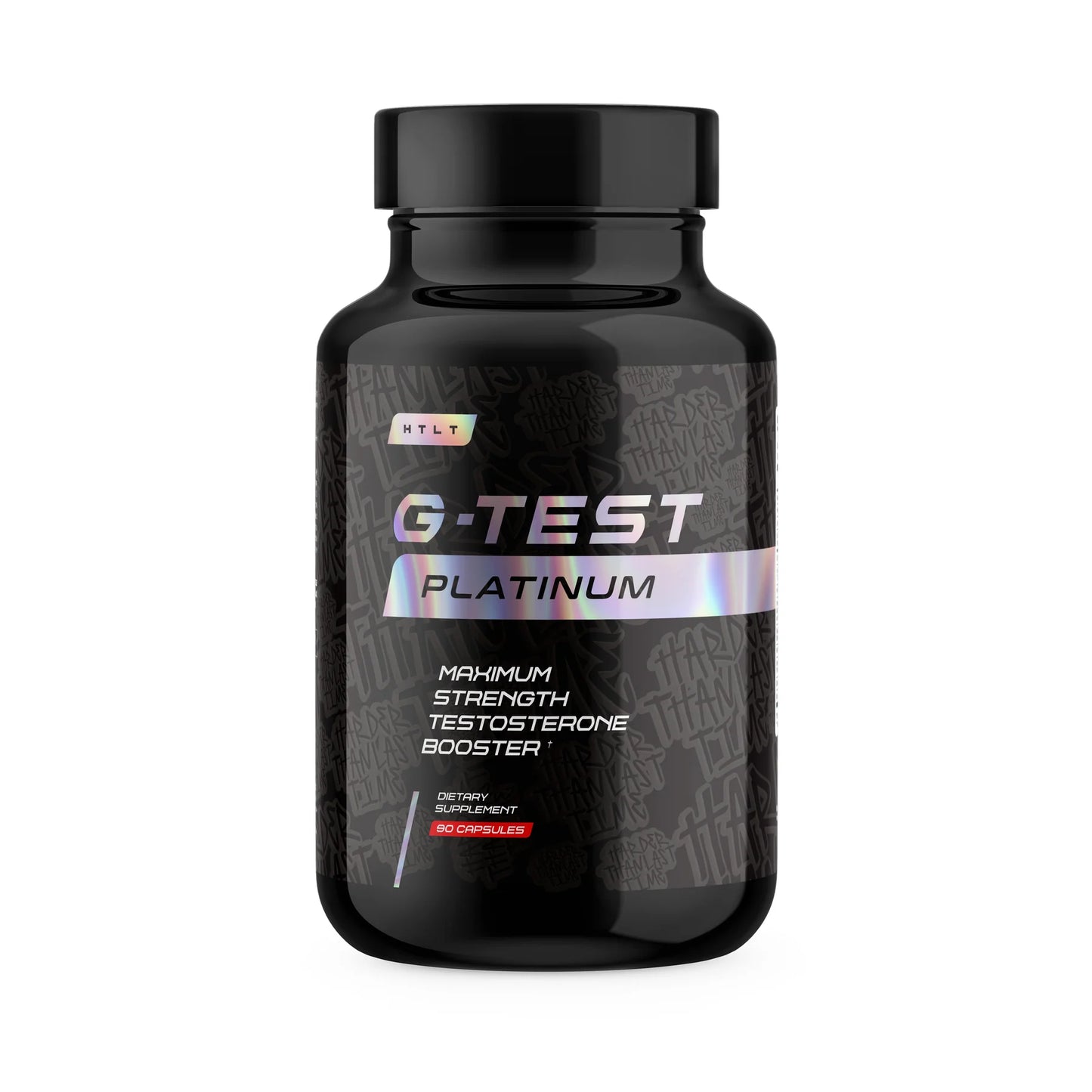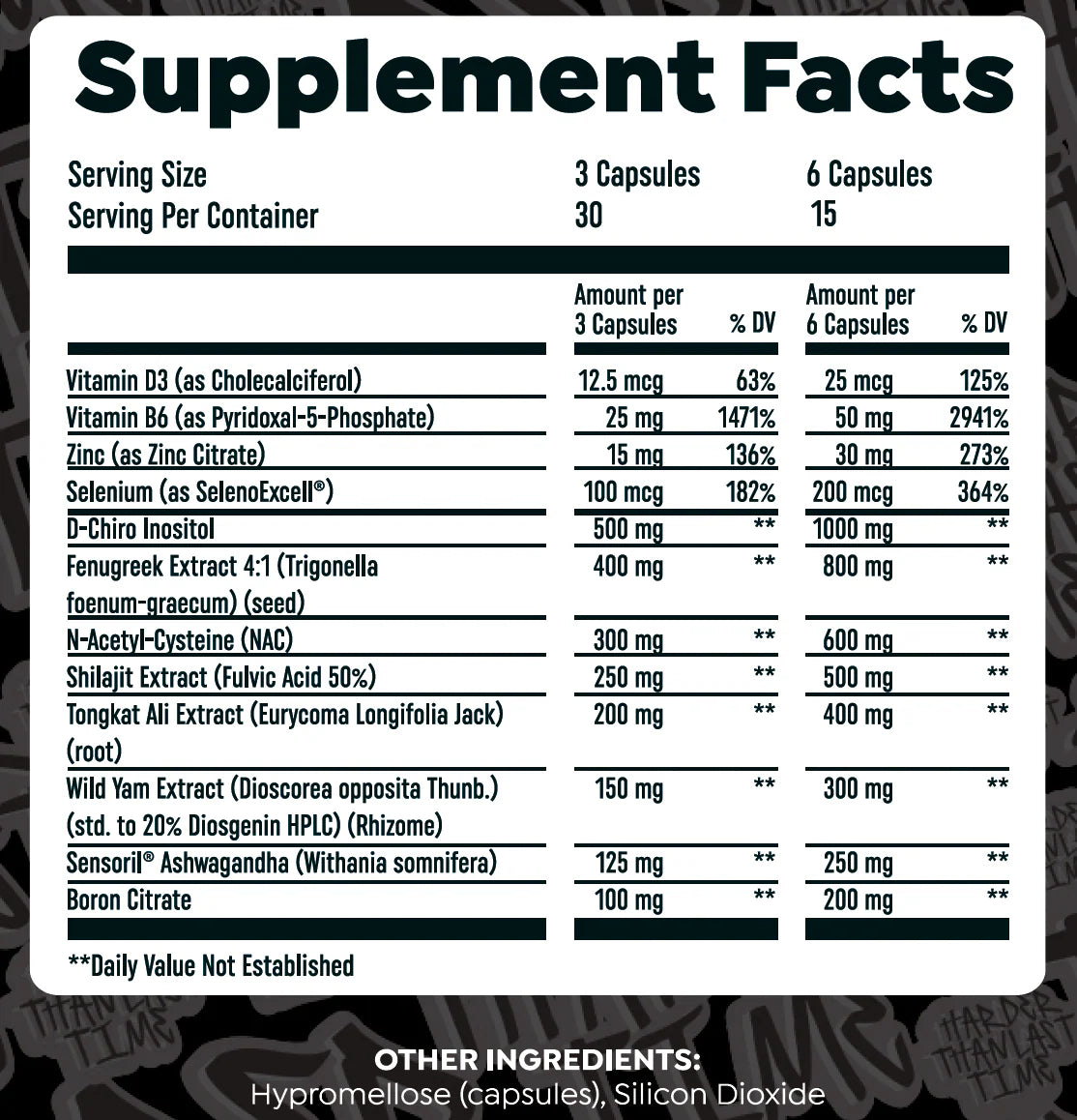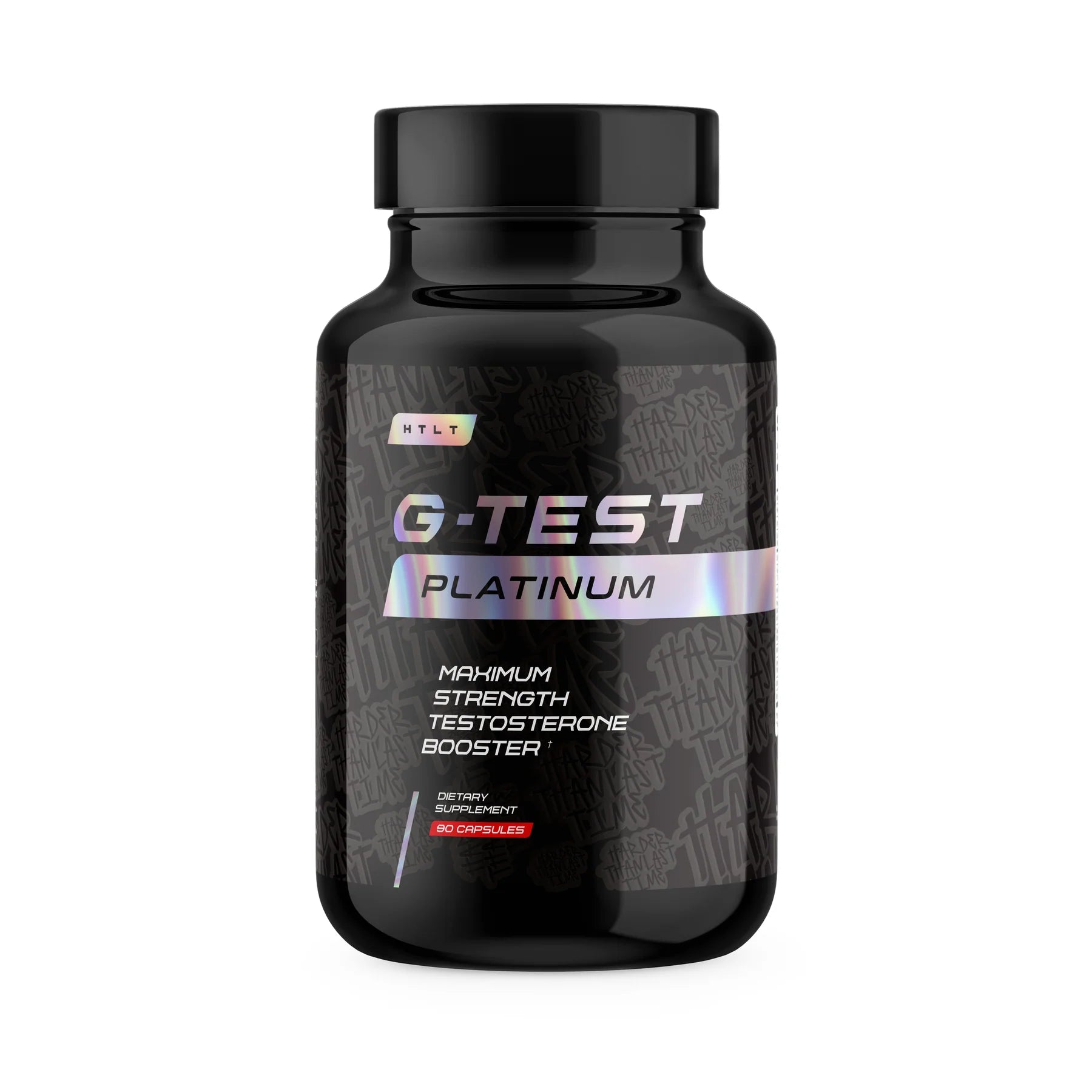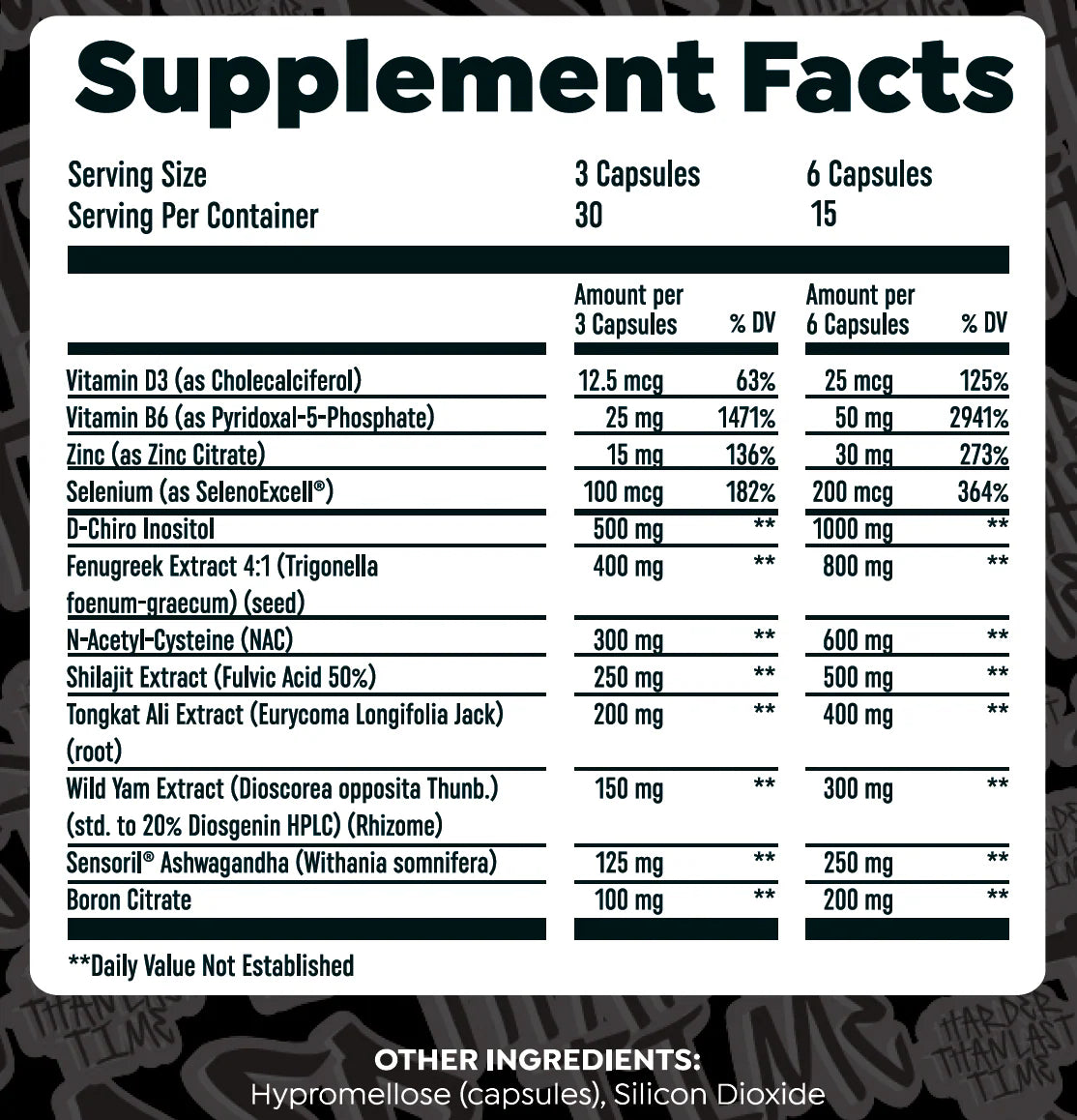HTLT G-Test Platinum
HTLT G-Test Platinum
Couldn't load pickup availability
Premium Test Booster!
HTLT G-Test Platinum is an advanced natural testosterone support formula by Harder Than Last Time (HTLT). Powered by premium ingredients like Tongkat Ali, Fadogia Agrestis, and Fenugreek, it’s designed to help boost testosterone levels, enhance muscle growth, and improve strength, energy, and libido. G-Test Platinum supports optimal hormone balance and athletic performance without harsh stimulants. Perfect for men seeking better recovery, vitality, and overall performance, this upgraded formula delivers clinically backed ingredients in precise dosages. Experience the next level of natural testosterone support with HTLT G-Test Platinum—where science, quality, and results come together for maximum impact.
Ingredients
Ingredients
Tongkat Ali Extract
Tongkat Ali (Eurycoma longifolia) is a medicinal herb native to Southeast Asia, particularly Malaysia and Indonesia. Often called “Malaysian ginseng,” it’s renowned for its ability to enhance vitality, stamina, and libido. The active compounds—such as eurycomanone—are believed to boost testosterone levels, reduce stress by lowering cortisol, and improve overall energy and physical performance. Traditionally used as a natural remedy for fatigue, low libido, and aging-related issues, Tongkat Ali is now widely available as a supplement. Scientific studies suggest potential benefits for muscle growth, fertility, and mood enhancement, making it a popular natural adaptogen for both men and women.
A meta analysis done in 2021 by Lazarus et al evaluating 7 human trials found a positive net change in total testosterone levels with Tongkat Ali supplementation compared to placebo, in both hypo & eugonadal men.
Ashwagandha Extract (Sensoril)
Ashwagandha is an Ayurvedic herb historically used as an adaptogen. It can significantly increase testosterone levels in males and is thought to do so by downregulation of cortisol. The systematic review below provides an overview of the effects of this herb on male sex hormones and its safety profile.
D-Chiro Inositol is a cyclic sugar alcohol with biological activity as a second-messenger in the insulin signalling cascade, possessing anti-hyperglycemic and aromatase inhibiting properties, it has been shown to positively affect testosterone levels in males [6,7]. In a pilot trial on 10 healthy males, oral administration of D-chiro-inositol administration at 1g/day was associated with reduced serum levels of estrone (- 85.0%) and estradiol (- 14.4%), and increased serum levels of testosterone (+ 23.4%) and dehydroepiandrosterone (DHEA) (+ 13.8%) [7]. Additionally, epiandrosterone levels were higher (+39%) after treatment [7].
Fenugreek Extract
Fenugreek is a spice which has an extensive use in food preparation and more recently sports supplementation, a recent meta analysis by Isenmann et al conducted a quantitative analysis on 6 human trials evaluating the effects of fenugreek preparations on sex hormones and athletic markers in healthy individuals; a statistically significant improvement was noted in total testosterone levels, free testosterone levels, and reductions of estradiol, stating that “chronic application of fenugreek has performance-enhancing and anabolic effects in male athletes” [19].
NAC (N-Acetyl-Cysteine) & Selenium
In a randomized double blind placebo controlled trial published in The Journal of Urology by Safarinejad et al, it was found that administration of NAC (600mg/daily) and Selenium (200mcg/daily) in combination led to a significant increase in serum testosterone levels and improvement of sperm parameters in infertile men [20].
The exact mechanism is unknown, the authors state: “A prominent hypothesis is that decreased antioxidant function may be a contributing factor (of hypogonadism).”, indicating that the improvements in testicular function may be attributed to a reduction of oxidative stress affecting the leydig and sertoli cells of the testes [20].
Boron
Boron is a trace mineral found in coffee, dairy, fruits and vegetables. Supplementation with boron has been shown to increase free testosterone levels in males, primarily through its effects on the metabolism of sex hormones and SHBG [8,9].
Shilajit Extract (std. 50% Fulvic Acid, PrimaVie)
Shilajit is an ingredient derived from decomposed organic plant material and minerals, characterized by its richness in fulvic acid amongst other organic compounds [23].
It has a long history of use in South and East Asia for increasing vitality [23].
Trials evaluating Shilajit’s effects on males’ testosterone levels are promising, in which the greatest response was seen in hypogonadal men, seeing a +23.5% improvement in total testosterone levels [21].
In another human trial, Shilajit administration was also shown to significantly increase total testosterone, free testosterone and DHEA-S levels in healthy volunteers compared to placebo [22].
Wild Yam Extract (std. for Diosgenin)
Wild yam extract contains a significant amount of Diosgenin, a steroidal saponin which has been studied in humans as being a beneficial natural compound for improving athletic performance and increasing sex hormone levels in healthy males [18]. In a randomized placebo controlled trial, Diosgenin supplementation combined with resistance training increased serum DHEA, serum DHT, serum free testosterone, increased 1-rep max on the deadlift and increased arm fat-free mass compared to placebo [18].
Zinc Citrate
Zinc deficiency can be a cause of low testosterone levels in men, zinc supplementation has been shown to reliably increase testosterone production in zinc-deficient men and is a first line intervention when trying to naturally increase testosterone levels in the context of nutrient deficiency [10,11].
P5P (Pyridoxal phosphate, active form of vitamin B6)
The active form of vitamin B6, P5P, has been shown to improve outcomes in the context of hyperprolactinemia, a possible endocrine cause of hormonal suppression (excess prolactin secretion results in secondary hypogonadism) [12,13,14]. Although the trials evaluating Vitamin B6/P5P’s effects on hyperprolactinemia used a very high dosage (300mg q12h PO), we felt a lower dose was warranted as the degree of hyperprolactinemia experienced by the participants in this trial was pharmacologically induced (secondary to antipsychotic use), above and excess of what might exist in individuals who do not have prolactinomas or concurrent use of antipsychotics. The dosage we used was less than the studied dosage with intent to target a favorable safety profile (some individuals can experience peripheral neuropathy with very high doses of vitamin B6).
Vitamin D3
Vitamin D3 deficiency is a common global health issue which exists primarily in higher latitudes where individuals may not get adequate sunlight exposure throughout the year, some forms of secondary hypogonadism have a strong association with vitamin D deficiency [16]. Correcting deficient vitamin D levels is a safe and effective way to promote optimal health outcomes, especially in the context of deficiency. G Test+ implements a dosage in line with the RDA for vitamin D3 as a conservative approach, to reduce the risk of hypervitaminosis D for those who already consume a daily vitamin D supplement or plan to take this perpetually (fat-soluble vitamins can accumulate in tissues if taken in excess for long durations and can lead to toxicity if levels become too high).
Research
Research
- Chan, K. Q., Stewart, C., Chester, N., Hamzah, S. H., & Yusof, A. (2021). The effect of Eurycoma Longifolia on the regulation of reproductive hormones in young males. Andrologia, 53(4). https://doi.org/10.1111/and.14001
- Leisegang, K., Finelli, R., Sikka, S. C., & Selvam, M. K. P. (2022). Eurycoma longifolia (Jack) Improves Serum Total Testosterone in Men: A Systematic Review and Meta-Analysis of Clinical Trials. Medicina, 58(8). https://doi.org/10.3390/medicina58081047
- Rehman, S. U., Choe, K., & Yoo, H. H. (2016). Review on a Traditional Herbal Medicine, Eurycoma longifolia Jack (Tongkat Ali): Its Traditional Uses, Chemistry, Evidence-Based Pharmacology and Toxicology. Molecules, 21(3), Article 3. https://doi.org/10.3390/molecules21030331
- Eng, A. (2007). Correcting systemic androgen levels using Eurycoma longifolia (United States Patent No. US20070009621A1). https://patents.google.com/patent/US20070009621A1/en
- Chinnappan, S. M., George, A., Pandey, P., Narke, G., & Choudhary, Y. K. (2021). Effect of Eurycoma longifolia standardised aqueous root extract-Physta® on testosterone levels and quality of life in ageing male subjects: a randomised, double-blind, placebo-controlled multicentre study. Food & nutrition research, 65, 10.29219/fnr.v65.5647. https://doi.org/10.29219/fnr.v65.5647
- Montt-Guevara, M. M., Finiguerra, M., Marzi, I., Fidecicchi, T., Ferrari, A., Genazzani, A. D., & Simoncini, T. (2021). D-Chiro-Inositol regulates insulin signaling in human adipocytes. Frontiers in Endocrinology, 12, Article 660815. https://doi.org/10.3389/fendo.2021.660815
- Monastra, G., Vazquez-Levin, M., Bezerra Espinola, M.S. et al. D-chiro-inositol, an aromatase down-modulator, increases androgens and reduces estrogens in male volunteers: a pilot study. Basic Clin. Androl. 31, 13 (2021). https://doi.org/10.1186/s12610-021-00131-x
- Naghii, M. R., Mofid, M., Asgari, A. R., Hedayati, M., & Daneshpour, M.-S. (2011). Comparative effects of daily and weekly boron supplementation on plasma steroid hormones and proinflammatory cytokines. Journal of Trace Elements in Medicine and Biology: Organ of the Society for Minerals and Trace Elements (GMS), 25(1), 54–58. https://doi.org/10.1016/j.jtemb.2010.10.001
- Pizzorno L. Nothing Boring About Boron. Integr Med (Encinitas). 2015 Aug;14(4):35-48. PMID: 26770156; PMCID: PMC4712861.
- Khan, S. S., Carter, R. E., & Greenland, P. (2023). Association of anemia with cardiovascular disease: A cohort study. The American Journal of Medicine. Advance online publication. https://doi.org/10.1016/j.amjmed.2023.01.045
- As, P., Cs, M., Fw, B., Jw, H., & Gj, B. (1996). Zinc status and serum testosterone levels of healthy adults. Nutrition (Burbank, Los Angeles County, Calif.), 12(5). https://doi.org/10.1016/s0899-9007(96)80058-x
- Zhuo, C., Xu, Y., Wang, H., Fang, T., Chen, J., Zhou, C., Li, Q., Liu, J., Xu, S., Yao, C., Yang, W., Yang, A., Li, B., Chen, Y., Tian, H., & Lin, C. (2021). Safety and Efficacy of High-Dose Vitamin B6 as an Adjunctive Treatment for Antipsychotic-Induced Hyperprolactinemia in Male Patients With Treatment-Resistant Schizophrenia. Frontiers in Psychiatry, 12.
- Witwit, Suha. (2018). The Role of Vitamin B6 in Reducing Serum Prolactin in Comparison to Cabergoline. International Journal of Pharmaceutical Quality Assurance. 10. 10.25258/ijpqa.10.1.17.
- Araújo, A. N., Wessling, A., & Bugalho, M. J. (2018). Male hypogonadism – when two endocrine causes merge in the same patient. Endocrine Abstracts, 56, P810. https://doi.org/10.1530/endoabs.56.P810
- Janz, T., & Pearson, C. (2013). Vitamin D blood levels of Canadians. Health at a Glance. Statistics Canada Catalogue no. 82-624-X. https://www150.statcan.gc.ca/n1/pub/82-624-x/2013001/article/11727-eng.htm
- Lee, D. M., Tajar, A., Pye, S. R., Boonen, S., Vanderschueren, D., Bouillon, R., O'Neill, T. W., Bartfai, G., Casanueva, F. F., Finn, J. D., Forti, G., Giwercman, A., Han, T. S., Huhtaniemi, I. T., Kula, K., Lean, M. E., Pendleton, N., Punab, M., Wu, F. C., & EMAS study group (2012). Association of hypogonadism with vitamin D status: the European Male Ageing Study. European journal of endocrinology, 166(1), 77–85. https://doi.org/10.1530/EJE-11-0743
- Pilz, S., Frisch, S., Koertke, H., Kuhn, J., Dreier, J., Obermayer-Pietsch, B., Wehr, E., & Zittermann, A. (2011). Effect of Vitamin D Supplementation on Testosterone Levels in Men. Hormone and Metabolic Research, 43(3), 223–225. https://doi.org/10.1055/s-0030-1269854
- Horii, N., Hasegawa, N., Fujie, S., Iemitsu, K., Uchida, M., Hamaoka, T., & Iemitsu, M. (2020). Effects of Dioscorea esculenta intake with resistance training on muscle hypertrophy and strength in sprint athletes. Journal of Clinical Biochemistry and Nutrition, 67(3), 338–343. https://doi.org/10.3164/jcbn.19-124
- Isenmann, E., Alisauskas, P., Flenker, U., Schalla, J., & Diel, P. (2023). The Anabolic Effect of Fenugreek: A Systematic Review with Meta-analysis. International journal of sports medicine, 44(10), 692–703. https://doi.org/10.1055/a-2048-5925
- Safarinejad, M. R., & Safarinejad, S. (2009). Efficacy of selenium and/or N-acetyl-cysteine for improving semen parameters in infertile men: a double-blind, placebo controlled, randomized study. The Journal of urology, 181(2), 741–751. https://doi.org/10.1016/j.juro.2008.10.015
- Biswas, T. K., Pandit, S., Mondal, S., Biswas, S. K., Jana, U., Ghosh, T., Tripathi, P. C., Debnath, P. K., Auddy, R. G., & Auddy, B. (2010). Clinical evaluation of spermatogenic activity of processed Shilajit in oligospermia. Andrologia, 42(1), 48–56. https://doi.org/10.1111/j.1439-0272.2009.00956.x
- Pandit, S., Biswas, S., Jana, U., De, R. K., Mukhopadhyay, S. C., & Biswas, T. K. (2016). Clinical evaluation of purified Shilajit on testosterone levels in healthy volunteers. Andrologia, 48(5), 570–575. https://doi.org/10.1111/and.12482
- Carrasco-Gallardo, C., Guzmán, L., & Maccioni, R. B. (2012). Shilajit: a natural phytocomplex with potential procognitive activity. International journal of Alzheimer's disease, 2012, 674142. https://doi.org/10.1155/2012/674142
Share




